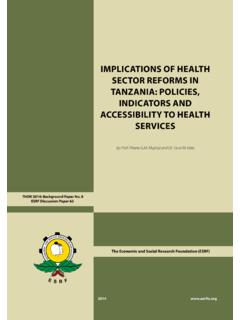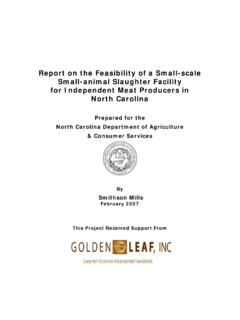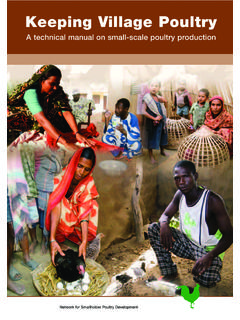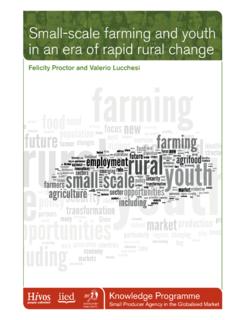Transcription of IMPACT OF CLIMATE CHANGE TO SMALL SCALE FARMERS: …
1 IMPACT OF CLIMATE CHANGE . TO SMALL SCALE farmers : VOICES OF farmers IN. village communities IN. tanzania . By Apronius Mbilinyi, Georgina Ole Saibul (PhD), Vivian Kazi ESRF DISCUSSION PAPER No. 47. The Economic and Social Research Foundation (ESRF). 2013 IMPACT OF CLIMATE CHANGE TO. SMALL SCALE farmers : VOICES OF. farmers IN village communities . IN tanzania . By Apronius Mbilinyi, Georgina Ole Saibul (PhD), Vivian Kazi ESRF Discussion Paper No. 47. Published By: Economic and Social Research Foundation 51 Uporoto Street (Off. Ali Hassan Mwinyi Rd.) Ursino Estate Box 31226, Da es Salaam Tel: (+255) 22 2760260, Mobile: (+255) 754280133.
2 Fax: (+255) 22 2760062. Email: Website: ISBN: 978-9987-610-80-8. @ 2013 Economic and Social Research Foundation ESRF Discussion Paper No. 47 | i TABLE OF CONTENTS. List of Rationale of the Research IMPACT of CLIMATE CHANGE on Conceptual Type of Sources of Data Collection Method of Analysis and Study Sampling Procedure and Discussion of Climatic Variations Affecting Crop Challenges in Livestock Socio-economic IMPACT due to CLIMATE Environmental Management and CLIMATE Adaptation ii | ESRF Discussion Paper No. 47. LIST OF ABBREVIATIONS. AND ACRONYMS. CSO Civil society Organization DP Development Partners FGD Focus Group Discussion IFAD International Food and Agriculture Development IPCC International Panel on CLIMATE CHANGE NGO Non Governmental Organization TACRI tanzania Coffee Research Institute TMA tanzania Medical Agency UNDP United Nations Development Program UNFCC United Nations Forum For CLIMATE CHANGE WFP World Food Program ESRF Discussion Paper No.
3 47 | iii iv | ESRF Discussion Paper No. 47. INTRODUCTION. CLIMATE CHANGE is defined as a result of temperature variability due to emissions of greenhouse gases produced by human activities (Hope, 2009). According to Hope (2009:451) human activities such as burning of fossil fuels, industrial production, cutting down of rainforests CHANGE the atmosphere's composition by increasing the amount of greenhouse gases, which, in turn, traps heat in the atmosphere and thereby facilitating climatic changes'. Mubaya et al (2010), note that the IMPACT of CLIMATE CHANGE is two-fold, bio-physical and socio-economic.
4 Whereby bio-physical IMPACT include rising sea waters, more frequent and intense storms, extinction of species, worsening drought, crop failure. As well as changes in cloud cover and precipitation, melting of polar ice caps and glaciers, and reduced snow cover (Mendelsohn and Dinah, 2005; UNDP, 2004; UNFCCC, 2007). There is linkage between bio-physical and socio-economic impacts of CLIMATE CHANGE . The environmental degradation caused by bio-physical impacts creates socio-economic impacts. This is mainly on the agricultural sector where areas suitable for agriculture, the length of growing seasons and yield potential, particularly along the margins of semi-arid and arid areas are expected to decrease (Mubaya et al.)
5 , 2010:172). Consequently, affects SMALL SCALE subsistence farmers in terms of productivity, food security and family income. However, in middle and higher latitudes areas the IMPACT of CLIMATE CHANGE is to extend the length of the potential for growing seasons. Although there are positive impacts the focus is on negative impacts of CLIMATE CHANGE because the positive impacts do not last as the CLIMATE continues to CHANGE . In addition the positive impacts are only in few areas and adverse effects are projected to predominate the world, especially in the tropics and subtropics (Mubaya et al., 2010).
6 For example, it is estimated that over billion people in the world live in areas prone to more than one type of the physical manifestations of CLIMATE CHANGE which include; floods, storms, droughts and sea level rise 1(FAO, 2005). The most vulnerable people live in the semi-arid dry land belt countries, Sub-Saharan Africa, South and Southeast Asia, Latin America, SMALL Island developing states and the Arctic. CLIMATE CHANGE is expected to have a significant IMPACT on the livelihoods of the rural poor in developing countries. The Fourth Assessment Report of the Intergovernmental Panel on CLIMATE CHANGE (IPCC) predicts that CLIMATE CHANGE is likely to have a significant effect on agricultural production in many African countries.
7 CLIMATE variability will increase almost everywhere. Effects of CLIMATE CHANGE and CLIMATE variability will continue to challenge vulnerable people. Droughts and dry spells will be more frequent, rain more inconsistent, and torrential downpours heavier, all phenomena that increase the risk of soil erosion and vegetation damage through runoff. Higher temperatures will increase the evaporation of soil moisture. CLIMATE CHANGE will aggravate water stress, which the continent has already experienced; more people will be at risk of water stress (Boko et al, 2007). 1 CLIMATE CHANGE The anatomy of a silent crisis (2009), Global humanitarian Forum ESRF Discussion Paper No.
8 47 | 1. Africa is among the continents most vulnerable to CLIMATE CHANGE and CLIMATE variability. Socio-economic developments exacerbate the effects of CLIMATE CHANGE on ecosystems and humanity. Boko et al (2007) indicate that endemic poverty, poor governance, limited access to capital and global markets, ecosystem degradation, complex disasters and conflicts, and urbanization are factors that may undermine communities ' ability to adapt to CLIMATE CHANGE . The economies of many African nations are dependent on sectors that are vulnerable to CLIMATE conditions, such as agriculture, fisheries, forestry, and tourism.
9 Agriculture and natural resources provide the livelihood for 70% to 80% of the population, and account for 30% of GDP and 40% of export revenue in Sub-Saharan Africa (Toulmin and Huq 2006). In Sub-Saharan Africa agriculture employs 60% to 90% of the total labour force (Thornton et al. 2006). tanzania is not different from the rest of Sub-Saharan African countries, agriculture is the dominant sector accounting for of employed persons (National Bureau of Statistics, 2007). In addressing the challenges of global warming and CLIMATE CHANGE , the focus for a while has been on reducing green house emissions.
10 There has been little progress on reducing these emissions and the CLIMATE has continued to CHANGE affecting the agriculture sector negatively in many developing countries. Lately the focus has shifted to adaptation measures to reduce vulnerability to CLIMATE CHANGE impacts (Guthiga and Newsham, 2011). In tanzania where of the employed persons are in the agriculture sector, the continued impacts of CLIMATE CHANGE have and will continue to have devastating effects on the economy, food security and threaten the stability of the country. It is crucial for tanzania to invest in terms of financial resources and research on adaptation measures farmers could implement to cope with climatic changes especially in the agriculture sector.












